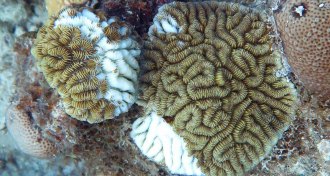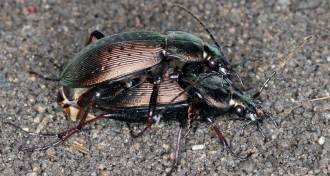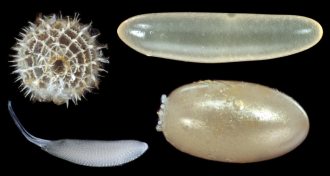News
-
 Oceans
OceansA mysterious coral disease is ravaging Caribbean reefs
Scientists are racing to learn what’s behind a disease that’s “annihilating” whole coral species in hopes of stopping it.
-
 Animals
AnimalsGround beetle genitals have the genetic ability to get strange. They don’t
A new look at the genetics of sex organs finds underpinnings of conflicts over genital size.
By Susan Milius -
 Health & Medicine
Health & MedicineBreaking down the science behind some of your favorite summer activities
Inject some science into your summer.
-
 Oceans
OceansThe largest seaweed bloom ever detected spanned the Atlantic in 2018
Nutrient-rich water from the Amazon River may be helping massive seaweed mats to flourish each summer in the Atlantic Ocean.
-
 Ecosystems
EcosystemsWhy some insect eggs are spherical while others look like hot dogs
Analyzing a new database of insect eggs’ sizes and shapes suggests that where eggs are laid helps explain some of their diversity of forms.
By Yao-Hua Law -
 Anthropology
AnthropologyEast Asians may have been reshaping their skulls 12,000 years ago
An ancient skull-molding practice had a long history in northeastern Asia, researchers say.
By Bruce Bower -
 Neuroscience
NeuroscienceThis brain region may be why some robots send chills down your spine
Scientists may have traced the source of the “uncanny valley” sensation in the brain.
-
 Health & Medicine
Health & MedicineCalifornia’s new vaccine rules kept more kindergartners up-to-date
Three statewide interventions improved the rates of kindergartners behind on required vaccinations in California, researchers report.
-
 Climate
ClimateCO2 emissions are on track to take us beyond 1.5 degrees of global warming
Current and planned infrastructure will exceed the level of emissions that would keep global warming to 1.5 degrees Celsius, a new analysis finds.
-
 Astronomy
AstronomyHow the 2019 eclipse will differ from 2017’s — and what that means for science
This year’s total solar eclipse is visible late in the day from a relatively small slice of South America.
-
 Climate
ClimateIs climate change causing Europe’s intense heat? A scientist weighs in
Science News talks with climate scientist Karsten Haustein about attributing extreme heat events in Europe and South Asia to climate change.
-
 Materials Science
Materials ScienceLatest claim of turning hydrogen into a metal may be the most solid yet
If true, the study would complete a decades-long quest to find the elusive material. But such claims have been made prematurely many times before.